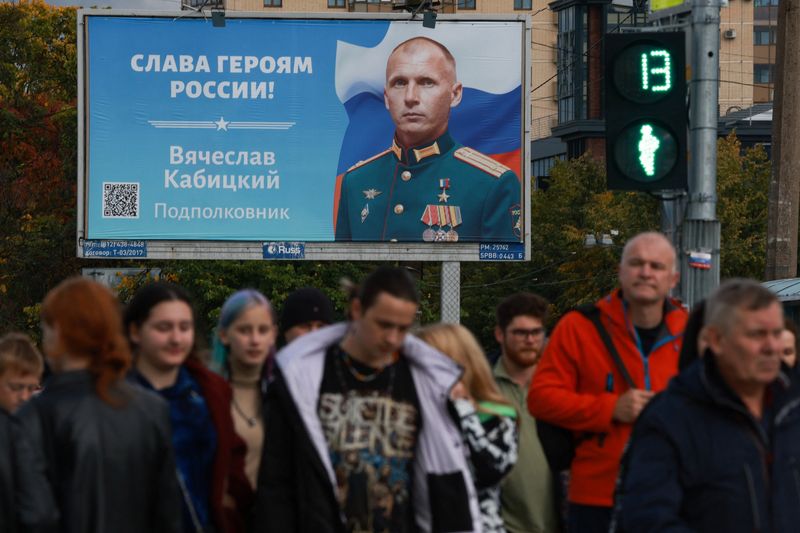Many Russians seek ways out as call-up orders arrive
2022.09.21 13:13
[ad_1]

© Reuters. FILE PHOTO: Pedestrians cross a street near a board with a portrait of a Russian service member Vyacheslav Kabitskiy in Saint Petersburg, Russia September 17, 2022. REUTERS/Anton Vaganov
By Caleb Davis
GDANSK, Poland (Reuters) – Moments after President Vladimir Putin called up 300,000 reservists on Wednesday in Russia’s first such mobilisation since World War Two, a human rights lawyer said citizens had already started getting orders to enlist.
In St Petersburg, Pavel Chikov said recruitment offices had handed packs of conscription papers to homeowners’ associations.
Defence Minister Sergei Shoigu said the army was calling up people with experience of service and military “specialists” to fight in Ukraine.
But there was little clarity as to who these would be.
The Kremlin said parts of the decree had deliberately not been published. Margarita Simonyan, editor-in-chief of the state media outlet RT and a vocal Putin supporter, said in a post that the list of specialities being recruited was classified, but offered to gather questions from the public and pass them to the Defence Ministry.
But medical skills appeared to be in demand, because Chikov, who has advised objectors looking to avoid the draft, said medics in Moscow were “receiving summonses from recruitment offices en masse to come and receive mobilisation orders”.
Some companies reportedly asked employees to urgently provide details of their military service.
“We already have employees who have received summonses for tomorrow. Everyone should be aware that it is possible they will be summoned in the morning and be unable to work the next day,” one major company told employees, in a note seen by Reuters.
“Keep managers informed so we don’t lose track of each other.”
On the Moscow metro, men could be seen studying call-up papers, and on the streets, some residents were concerned about the biggest escalation of the conflict since Russia invaded Ukraine almost 7 months ago.
‘NOT LETTING US OUT’
“You always feel worried at moments like these. Because you have a wife and kids and you think about it,” one resident told Reuters.
One-way flights out of Russia rocketed in price and sold out fast after the announcement, amid fears that men of fighting age would not be allowed to leave.
But for some it was already too late.
In the city of Kursk, one woman married to a soldier said: “They’re not letting people out of Kursk. There are police cordons everywhere, checking each car. If a man is driving, they inspect; if it’s a woman, they ask her to open the luggage compartment. If the man is from Kursk, they turn you back.”
A Telegram social media channel created on Wednesday to share the locations where enlistment officers had been sighted quickly amassed more than 13,000 subscribers.
It posted photos appearing to show officers in various public spaces carrying papers. Reuters was not able to immediately verify these reports.
“I’m probably not eligible for mobilisation, but I’d rather go to jail,” said one member of staff at an investment company who declined to be named.
Moscow may be counting on its ability to head off any unrest triggered by the mobilisation by either limiting the numbers called up from major cities or clamping down on protests, just as it has stifled almost all domestic political opposition.
The Vesna anti-war coalition called street protests in dozens of major cities but by early evening, Moscow time, more than 100 protesters had been detained, the independent monitoring group OVD-Info said.
For now, Shoigu said Russia would not call a general mobilisation, nor recruit students or send current conscripts to fight in Ukraine.
[ad_2]
Source link








